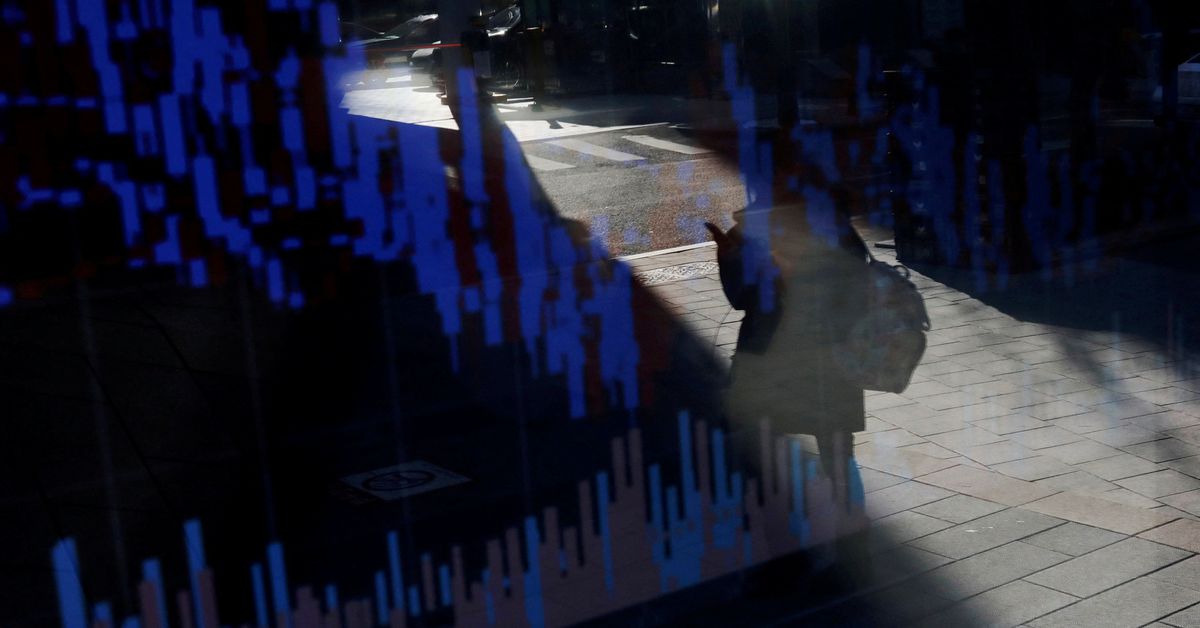A woman using her mobile phone is reflected on an electric board showing exchange rates of various cryptocurrencies at Bithumb cryptocurrencies exchange in Seoul, South Korea, January 11, 2018. REUTERS/Kim Hong-Ji/File Photo
SEOUL, May 19 (Reuters) – Reckoning they have little to lose with prices so ridiculously low, South Korean speculators in recent days have piled into Luna, a cryptocurrency that lost 99.99% of its value last week after its paired stablecoin TerraUSD collapsed.
Both tokens are affiliated with Terra, a blockchain platform co-founded by Korean developer Do Kwon and, according to blockchain analytics firm Elliptic, investors in them have lost around $42 billion.
Luna had been one of the world's most popular cryptocurrencies and its downfall, alongside TerraUSD, caused mayhem across the crypto spectrum globally, with bitcoin losing around a quarter of its value between May 9-12. read more
Worth nearly $100 in late April, Luna is now trading at a fraction of one cent – so low that there has been a rush of buying from speculators betting that it will stage a miraculous recovery, with some clinging to the belief that it is just too big to be allowed to fail.
"Luna was once a major coin of top-ten market capitalisation, so they will do whatever it takes to revive it," one hopeful investor wrote in a blog on South Korea's internet platform Naver, without saying who "they" could be.
The blogger said he had bought 300,000 Luna over the weekend at 0.33 won ($0.0003) each, using an international crypto exchange.
As the sudden resurgence of buying crossed its radar, South Korea's Financial Services Commission warned people on Tuesday against investing in Luna.
The number of investors in the failed cryptocurrency rose more than 50% in just over two days at South Korea's major exchanges to stand at 280,000 as of May 15, according to a source at the FSC who, as is customary for South Korean bureaucrats, declined to be named.
The buying mostly came from domestic speculators, though there were some inflows from abroad, the source said.
The window for speculation is limited as Bithumb and Upbit, two of South Korea's largest exchanges, said they will suspend trading support for Luna on May 27 and May 20, respectively, while another, Coinone, has halted deposits in the crypto-currency ahead of a possible de-listing on May 25.
The buying has had little affect on the token's price. It has spent the past week flopping between one-hundredth and four-hundredths of a cent.
But the propensity of South Koreans, particularly the younger ones, to invest in volatile and risky assets from stocks to cryptocurrencies has worried regulators.
Their earlier enthusiasm had helped put Luna and TerraUSD among the world's ten largest cryptocurrencies ranked by market cap.
But things fell apart on May 10, when TerraUSD's 1:1 peg to the dollar was shattered. On Wednesday it traded at around 10 cents.
Unlike most other major stablecoins which are backed by other assets, TerraUSD's value is derived by complex algorithmic processes, linked to its paired token Luna, which is free floating.
Under the system, one TerraUSD token could be swapped for $1 of Luna, and vice versa, and once swapped the coins would be destroyed.
If TerraUSD fell below $1, traders were incentivised to buy the stablecoin to swap it for $1 worth of Luna, and so reduce the supply of TerraUSD's and push its price back to $1.
That was the theory, but the market proved the premise wrong.
As the market imploded, hundreds of outraged retail investors flooded social media with tales of woe, with some of them asking Kwon to compensate their losses.
Kwon, last week, announced plans to change the system so TerraUSD will backed by reserves in future, but it is unclear whether this plan is achievable. read more
There is little the government can do to protect investors as cryptocurrency trading takes place outside its regulatory sphere.
($1 = 1,273.9300 won)
Our Standards: The Thomson Reuters Trust Principles.
Sign up to our investor newsletter to get the latest news and trends in global financial markets.
Subscribe to our newsletter to get all the news you need to start your day.
Reuters, the news and media division of Thomson Reuters, is the world’s largest multimedia news provider, reaching billions of people worldwide every day. Reuters provides business, financial, national and international news to professionals via desktop terminals, the world's media organizations, industry events and directly to consumers.
Build the strongest argument relying on authoritative content, attorney-editor expertise, and industry defining technology.
The most comprehensive solution to manage all your complex and ever-expanding tax and compliance needs.
The industry leader for online information for tax, accounting and finance professionals.
Access unmatched financial data, news and content in a highly-customised workflow experience on desktop, web and mobile.
Browse an unrivalled portfolio of real-time and historical market data and insights from worldwide sources and experts.
Screen for heightened risk individual and entities globally to help uncover hidden risks in business relationships and human networks.
All quotes delayed a minimum of 15 minutes. See here for a complete list of exchanges and delays.
© 2022 Reuters. All rights reserved
Author
Administraroot


